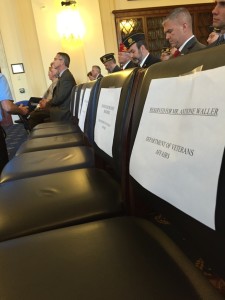
Lawmakers delve into relocation program for possible abuse
The Veterans Affairs Department's relocation scandal sheds light on a federal employee house-selling program that may be costing taxpayers.
The House Veterans Affairs Committee unanimously issued subpoenas Wednesday to five Veterans Affairs Department officials implicated in a relocation scandal, shedding further light on a potential problem that may affect every agency.
A Sept. 28 VA inspector general report stated that the government paid almost $212,000 to private contractor Brookfield Global Relocation to buy Diana Rubens’ house in the Washington area so she could take the job as Veterans Benefit Administration Philadelphia and Wilmington regional director.

Lawmakers now fear that the program VA used, which is implemented by all federal agencies, may be abused governmentwide.
VA paid for the sale of Rubens’ house through the Appraised Value Offer (AVO) Program. The policy is meant to help relocating employees sell their homes quickly. It works by having two separate appraisals of the house to determine its price. If the house is not sold within 60 days, the General Services Administration contracts a company to buy the house. The employee’s agency then pays the contractor an acquisition fee. That fee was 27.5 percent of the house’s value in fiscal 2014.
These companies “can discount that house 100 grand and sell it quickly and make $125,000 without blinking an eye,” said Rep. Phil Roe (R-Tenn.), during a House Veterans Affairs Committee hearing Wednesday.
The VA IG report found that Rubens told VA after she volunteered for reassignment that she would not take the job unless she was approved for the AVO program.
Now lawmakers are scrambling to find out if agencies are abusing the program, or if it needs further regulation to curb government waste.
“This raises the larger issue as to whether this program is being administered properly across the government,” House Veterans Affairs Committee Ranking Member Connie Brown (D-Fla.) said during the hearing. “If it’s not working for the VA, are they administering it wrong or is it a problem across the board?”
Brown said she is asking the Government Accountability Office to look into the matter.
VA Deputy IG Linda Halliday said a GAO investigation was an appropriate response.
The VA stopped the AVO program on Oct. 1 and said it reviewed other measures to retain and recruit talent, an Oct. 19 memo states.
“I think it’s unfair if all the other government agencies are using this program and it’s working, and all the VA employees are going to be left out,” Brown said.
Halliday said the potential for abuse of the program in other agencies is a possibility.
“It would be dependent on if [each department] had adequate controls in place to process all of the requests and authorizations made under the program,” she said.
Allegations part of larger scandal at VA
The AVO issue is part of a larger scandal over VA officials using their authority for personal and financial benefit.
VA principal deputy undersecretary for benefits, along with four Veterans Benefits Affairs regional directors, including Rubens, failed to appear before the committee.
The VA IG recommended criminal investigations into the actions of Rubens and the director of VBA St. Paul Regional Office Kimberly Graves.
The IG report stated that Rubens and Graves inappropriately coerced two other directors to leave their positions when they were not interested in leaving, so their vacancies would be created for Rubens and Graves.
The new positions held less responsibility and higher pay for the two directors, and VA paid about $400,000 for their relocations.
Last Friday, VA undersecretary for Benefits Alison Hickey stepped down. The American Legion called for her resignation after the IG report.
“That doesn’t solve the issues, there are some systemic issues and some questions that need to be answered by the VA,” American Legion National Commander Dale Barnett told Federal News Radio. “If we truly are going to talk about reforming the VA system then we to have actions not just words.”
Roe said the scandal was a “poster child” for losing faith in government.
“When average people … that go out and work for themselves for 30-something years do less, next year [they] get paid less. That’s what happens in the real world and that’s not what’s happening here,” Roe said. “These [expenses], to me, seem over the top. I say that because of the people I see every single week when I go home. Veterans that can’t get in to the Phoenix VA right now to get the care they need and they see this is very telling to me.”
The hearing to which the VA officials were subpoenaed to is set for Nov. 2, at 7:30 p.m.
Copyright © 2025 Federal News Network. All rights reserved. This website is not intended for users located within the European Economic Area.
Scott Maucione is a defense reporter for Federal News Network and reports on human capital, workforce and the Defense Department at-large.
Follow @smaucioneWFED




